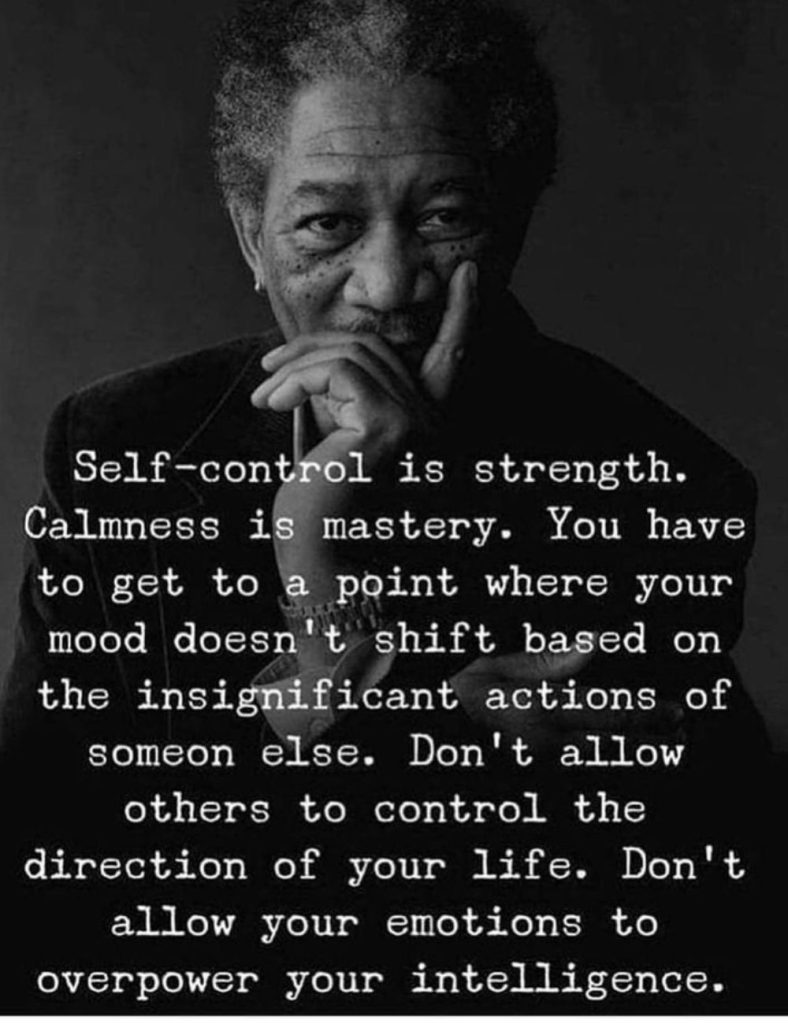The idea that self-control is a sign of strength has been around for a long time. When we have the discipline to control our impulses and emotions, it shows that we have inner strength and the ability to make wise choices. Self-control allows us to resist temptation and stay focused on our goals, even when it’s challenging.
On the other hand, the concept of calmness being a form of mastery is also quite profound. Being able to maintain a sense of inner peace and composure, even in the face of stress or adversity, demonstrates a deep level of emotional control and maturity. Calmness reflects a mastery over our reactions and the ability to respond thoughtfully rather than reactively. It’s a skill that takes practice to develop but is incredibly valuable.
The Art of Emotional Regulation
In a world that often rewards impulsivity and instant gratification, the virtues of self-control and calmness can be easily overlooked. However, these qualities are not signs of weakness, but rather the hallmarks of true strength and mastery.
The Power of Self-Control
Self-control is the ability to regulate one’s emotions, thoughts, and behaviors in the face of temptation or challenge. It is a skill that can be cultivated and developed over time, and its benefits are far-reaching.
When we exercise self-control, we are able to make decisions that align with our long-term goals and values, rather than succumbing to short-term impulses. This can lead to a range of positive outcomes, from improved academic and professional performance to healthier relationships and overall well-being.
Research has shown that individuals with high levels of self-control tend to be more successful in a variety of domains, from academic achievement to career advancement. They are also less likely to engage in risky or problematic behaviors, such as substance abuse or criminal activity.
The Importance of Calmness
Calmness, on the other hand, is the ability to maintain a state of inner peace and equanimity, even in the face of challenges or stressful situations. It is a quality that is often associated with wisdom and emotional maturity.
When we are calm, we are better able to think clearly, make rational decisions, and respond effectively to the demands of our environment. This can be particularly valuable in high-pressure or high-stakes situations, where the ability to remain composed and focused can make all the difference.
Additionally, calmness has been linked to a range of physical and mental health benefits. Studies have shown that individuals who are able to maintain a calm and centered state experience lower levels of stress, anxiety, and depression, as well as improved immune function and cardiovascular health.
Cultivating Self-Control and Calmness

Developing self-control and calmness is not something that happens overnight; it requires consistent practice and a willingness to challenge oneself. However, there are a number of strategies and techniques that can be employed to help individuals on this journey.
Mindfulness and Meditation
One of the most effective ways to cultivate self-control and calmness is through the practice of mindfulness and meditation. These practices involve the cultivation of present-moment awareness and the ability to observe one’s thoughts and emotions without judgment or reactivity.
Through regular meditation, individuals can learn to better regulate their emotions, reduce stress and anxiety, and develop a greater sense of inner peace and clarity. Additionally, research has shown that mindfulness-based interventions can improve cognitive function, including attention, memory, and decision-making.
Goal-Setting and Delayed Gratification
Another key aspect of developing self-control is the ability to delay gratification and work towards long-term goals. This can involve setting clear, measurable goals and then consistently taking actions that align with those goals, even in the face of immediate temptation or distractions.
By cultivating the habit of delayed gratification, individuals can learn to resist impulses and make choices that serve their higher values and priorities. This can lead to a range of benefits, from improved academic and professional performance to stronger relationships and overall life satisfaction.
Emotion Regulation Strategies
In addition to mindfulness and goal-setting, there are a number of specific emotion regulation strategies that can be employed to help develop self-control and calmness. These include cognitive reappraisal (reframing a situation in a more positive light), recentering (taking a step back and gaining a broader perspective), and distraction (shifting one’s focus to a different task or activity).
By practicing these strategies regularly, individuals can learn to better manage their emotional responses and maintain a sense of composure, even in the face of challenging or stressful situations.
The Benefits of Self-Control and Calmness

The benefits of cultivating self-control and calmness are numerous and far-reaching. From improved physical and mental health to enhanced personal and professional success, these qualities can have a profound impact on an individual’s overall well-being and quality of life.
Physical Health Benefits
Individuals with high levels of self-control and calmness tend to engage in healthier behaviors, such as regular exercise, a balanced diet, and adequate sleep. This can lead to a range of physical health benefits, including reduced risk of chronic diseases, improved cardiovascular function, and a stronger immune system.
Additionally, the ability to manage stress and regulate emotions can have a positive impact on physical health, as chronic stress has been linked to a variety of health problems, from high blood pressure to weakened immune function.
Mental Health Benefits
Self-control and calmness are also closely linked to mental health and well-being. Individuals who are able to regulate their emotions and maintain a sense of inner peace are less likely to experience symptoms of anxiety, depression, and other mental health issues.
Furthermore, the cultivation of these qualities can lead to improved cognitive function, including enhanced memory, attention, and problem-solving abilities. This can have a positive impact on academic and professional performance, as well as on personal relationships and overall life satisfaction.
Interpersonal Benefits
Self-control and calmness can also have a significant impact on an individual’s interpersonal relationships. When we are able to manage our emotions and respond to others with patience and understanding, we are more likely to build strong, meaningful connections with those around us.
Individuals with high levels of self-control and calmness tend to be more empathetic, compassionate, and effective communicators. This can lead to stronger, more fulfilling relationships with family, friends, and colleagues.
Conclusion
In a world that often values impulsivity and instant gratification, the virtues of self-control and calmness are more important than ever. By cultivating these qualities, individuals can not only improve their own physical and mental well-being but also positively impact the lives of those around them.
Through practices such as mindfulness, goal-setting, and emotion regulation strategies, individuals can learn to harness the power of self-control and calmness, and use these qualities to achieve greater personal and professional success, as well as a deeper sense of fulfillment and inner peace.
Ultimately, the journey towards self-control and calmness is not an easy one, but it is one that is well worth the effort. By embracing these virtues, we can not only become stronger and more resilient individuals but also contribute to the creation of a more peaceful and harmonious world.
Frequently Asked Questions :
What is the difference between self-control and calmness?
Self-control is the ability to regulate one’s emotions, thoughts, and behaviors in the face of temptation or challenge. Calmness, on the other hand, is the ability to maintain a state of inner peace and equanimity, even in the face of challenges or stressful situations.
How can mindfulness and meditation help develop self-control and calmness?
Mindfulness and meditation can help cultivate present-moment awareness and the ability to observe one’s thoughts and emotions without judgment or reactivity. This can lead to improved emotion regulation, reduced stress and anxiety, and a greater sense of inner peace and clarity.
What are some practical strategies for developing self-control and calmness?
In addition to mindfulness and meditation, practical strategies for developing self-control and calmness include goal-setting and delayed gratification, cognitive reappraisal, recentering, and distraction.
How do self-control and calmness impact physical and mental health?
Individuals with high levels of self-control and calmness tend to engage in healthier behaviors, which can lead to reduced risk of chronic diseases, improved cardiovascular function, and stronger immune system. They are also less likely to experience symptoms of anxiety, depression, and other mental health issues.
How can self-control and calmness benefit interpersonal relationships?
When individuals are able to manage their emotions and respond to others with patience and understanding, they are more likely to build strong, meaningful connections with those around them. Self-control and calmness can lead to more empathetic, compassionate, and effective communication.
Conclusion
In conclusion, self-control and calmness are not just virtues, but powerful tools for personal growth, success, and well-being. By cultivating these qualities through practices such as mindfulness, goal-setting, and emotion regulation strategies, individuals can not only improve their own lives but also positively impact the lives of those around them.
The journey towards self-control and calmness may not be an easy one, but the rewards are immense. By embracing these qualities, we can become stronger, more resilient individuals, and contribute to the creation of a more peaceful and harmonious world.






